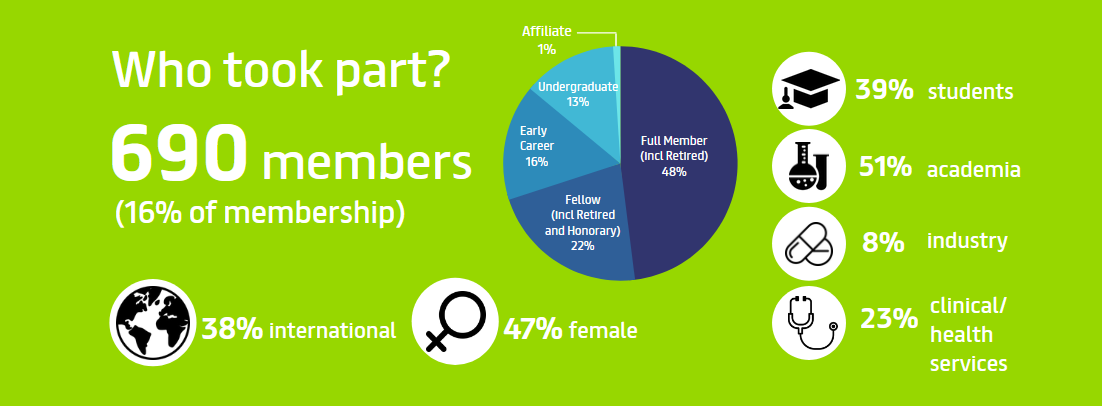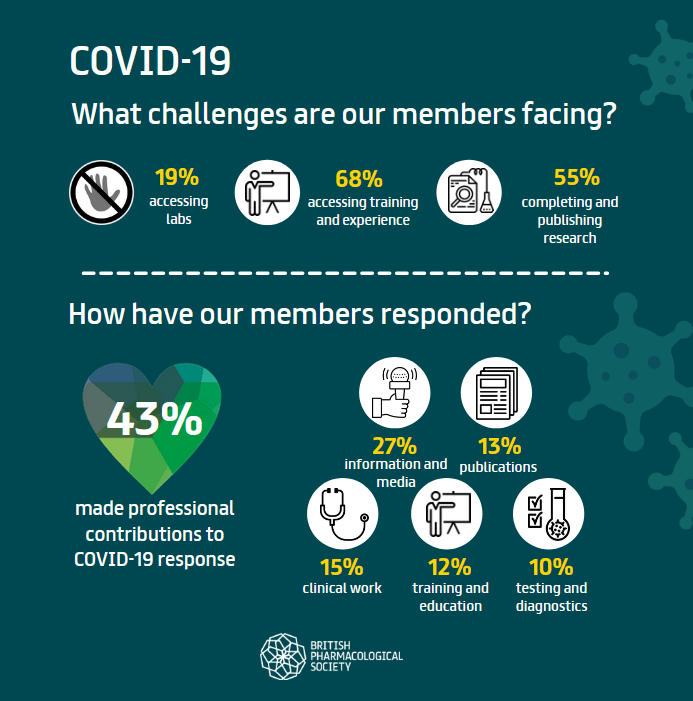.png.aspx)
Earlier this year, the Society conducted its latest member survey. The survey had the following aims:
- to understand attitudes toward the Society and member benefits to inform and improve the services provided
- to understand the impacts the COVID-19 pandemic has had on members
- to gather examples of how members have been involved in the pandemic response
690 members responded to the survey. This included a wide breadth of the membership, representing diverse career stages, professional settings, geographic locations, genders, and ethnic backgrounds. This feedback has provided a useful dataset as we focus on the Society’s strategy over the next 3 years.

How do members interact with the Society and its membership benefits?
It is important to know why members are joining the Society and retaining their membership. As we saw in earlier surveys, keeping up to date with developments in pharmacology continued to be why most respondents chose to join the Society. This was the case across membership categories. The next most popular reason for becoming a member was the ability to interact and network with other members. The number of respondents who joined to support their career progression had increased. This reason was particularly important for early career members.
.png.aspx)
The most important member benefits for 92% of respondents were discounted registration for Society meetings, and networking. This demonstrates how critical our meetings programme is to the membership community. These events provide networking opportunities that members value so much. We are continuing to develop online networking at our events, and through our online Community, which we were happy to learn had been used by a third of survey respondents.
.png.aspx)
Respondents valued our e-newsletters, as this was the most common way to engage with the Society over the last 12 months. Undergraduate and early career members were the membership categories most likely to engage with the Society on social media, but fellows and full members were also using social media, particularly Twitter, to connect with the Society.
.png.aspx)
87% of respondents were likely to recommend membership to colleagues and peers, including 54% who were very likely to support the Society in this way.
How has the COVID-19 pandemic affected Society members?
We know that the COVID-19 pandemic has affected all of our members. We wanted to understand how members had been impacted and how this varied across the membership, to help us to provide appropriate support.
A large proportion of respondents used new tools or software to change the way they engaged with colleagues or students or learnt new skills because of the pandemic. However, 68% agreed that the pandemic made it harder to access training and work experience, and 55% agreed that it had impacted their ability to complete and/or publish their research.
The survey also revealed that the pandemic had made more respondents feel pessimistic about their careers than optimistic. This was particularly the case for students and those working in academia. Those working in industry, members whose research is self-funded, and those from minority ethnic groups were more optimistic. Respondents in the UK were more likely to be optimistic than those based overseas. Overall, the men who responded were also more optimistic about their careers than the women.
It was great to learn that so many members used their professional expertise to contribute to the COVID-19 response. 43% of respondents contributed in a variety of ways, including involvement in vaccine research and development, clinical trials, publishing research, and providing information, advice, and media appearances.
43% of respondents also contributed outside of their professional activity, and undergraduate members were the most likely to do so. The most common examples reported were volunteering in the local community, providing information and tackling misinformation.
Most respondents had (and would continue to) face challenges in their work or studies because of the pandemic. Closed or restricted access to labs, delayed research activities and publications, and remote learning are all challenges for members. Members cited many other examples, including career instability, increased competition, and poor mental health.
We asked how the Society could support members to address challenges in the next 12 months. Almost a quarter of respondents highlighted careers support, mentoring, and helping to promote job opportunities. 19% of respondents also felt that providing or promoting funding opportunities would be beneficial.

How will the Society respond to these findings?
As the Society develops its new 3-year strategy, this feedback will be front and centre, helping us to decide how to adapt to best support our membership in 2022 and beyond. We are also finalising our membership strategy and a review of our prizes and awards. Our learnings from the member survey will help guide our thinking in all of these activities.
If you have any questions, or the report prompts you to share your experiences, please do not hesitate to get in touch.
Read the full survey report.
Download our infographic summary